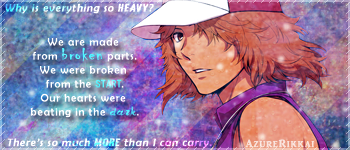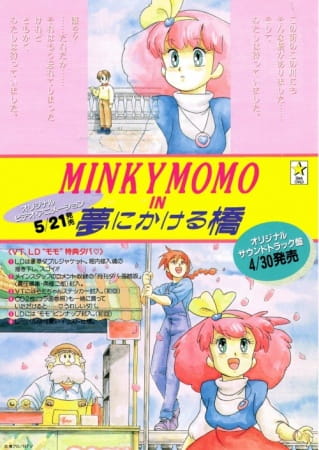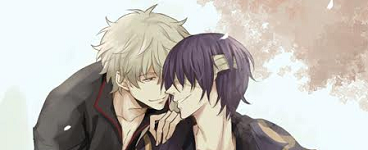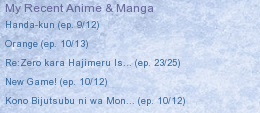New
What did you think of this episode?
DO NOT discuss the source material beyond this episode. If you want to discuss future events or theories, please use separate threads.
DO NOT ask where to watch/download this episode or give links to copyrighted, non-fair use material.
DO NOT troll/bait/harass/abuse other users for liking or disliking the series/characters.
DO read the Anime Discussion Rules and Site & Forum Guidelines.
DO NOT ask where to watch/download this episode or give links to copyrighted, non-fair use material.
DO NOT troll/bait/harass/abuse other users for liking or disliking the series/characters.
DO read the Anime Discussion Rules and Site & Forum Guidelines.
May 1, 2013 8:32 AM
#51
| Beautiful episode. But I have one question left, why did the last survivor need four bullets to kill himself? |
May 24, 2013 6:32 PM
#52
| Great episode as always. |
 |
May 30, 2013 11:58 PM
#53
| I pity those three workers, it's fascinating how they never bumped into each other for fifty years. Even though that country got rid of the king, they did the exact same thing as what the king did. So it's not surprising that they lost practically all of their population. |
Jun 13, 2013 1:55 AM
#54
Jul 30, 2013 12:33 PM
#55
Aug 2, 2013 5:40 AM
#56
| Where does a traveler head? Well, Kino kinda is a traveler because she travels, and she travels because she is a traveler. I think she travels for the journey, and not because there's some destination to reach. Your travel ends once you reach your destination and so does your existence as a traveler. In other words... the traveler isn't headed anywhere. They are just on a journey. Kino comfirms "I travel because I am a traveler" in the Kino no Tabi: The Beautiful World - Tou no Kuni special. |
BocchiAug 6, 2013 12:49 AM
Sep 29, 2013 5:50 PM
#57
| I guess that this episode tells us that humans want what they don't have and don't want what they have (people who had a job but didn't want to and people who didn't have a job but wanted to). And also at the same time, it was shown pointless what they were doing. I would like to see how those railroad workers would react if they ever found out that they have been living a meaningless life with no objectives accomplished (except helping their families with money even though we aren't sure that they are getting it because it's been 50 years since they started working without seeing their families). I think that at some point of our future, we will regret things that we did in the past because they were pointless even though we are not aware of its value at present time. |
fablionSep 29, 2013 5:58 PM
Oct 10, 2013 5:54 AM
#58
| I kind of took the whole "where are you headed traveler?" thing as, since the episode is talking about meaningless purpose in life, Kino's kind of pitying the road workers but is not headed anywhere in particular and therefore his journey is sort of meaningless in itself. So Kino avoids answering. I'm not sure, but that's what I took from it. |
| ._. |
Oct 17, 2013 3:42 PM
#59
| I thought the three men on the railroad situation was interesting. I did have a few problems with it though. The first man is actually a separate situation than the second and third man. The second and third man must go together for their story to work. Its kind of hard to explain uhhhmm: So basically the story could work with just a first man taking apart the railroad and a second man putting the railroad back together, its still ironic and could work as a story on its on. They can't work on their own because A) The man taking apart the railroad is still being productive because the resources taken apart from the railroad could be used/gathered by passerbys and B) the man putting the railroad back together would not exist if not for the man taking it apart. So these two men must work in tangent for the story to have meaning. The man who polishes the railroad however, is a lone factor because even without the 2 other men, his story works on its own. He has been polishing a railroad that has obviously been taken out of commission for 50 years. No one will ever use it and nobody benefits from the railroad being polished so his work is pointless. Something that was hard for me to wrap my head around was that, after the seeing the three men, i took comfort in the fact that "at least the first mans work is still intact, it is still a polished railroad and so he has done his job (in contrast to the other two who are basically undoing each other's work)" But when I looked at the railroad, it was UNPOLISHED? I was so confused. If it was a polished railroad, that was taken apart, and put back together again, then why were the rails unpolished towards the end? (THIS HAS NO PHILOSOPHICAL MEANING, I AM JUST NITPICKING CONTINUITY ERRORS HERE) Well then again, I guess the wear that goes into taking apart a railroad and putting it back together might wear off the polish :\ meh |
Oct 18, 2013 1:47 AM
#60
Funnymrbunny said: Something that was hard for me to wrap my head around was that, after the seeing the three men, i took comfort in the fact that "at least the first mans work is still intact, it is still a polished railroad and so he has done his job (in contrast to the other two who are basically undoing each other's work)" But when I looked at the railroad, it was UNPOLISHED? I was so confused. If it was a polished railroad, that was taken apart, and put back together again, then why were the rails unpolished towards the end? (THIS HAS NO PHILOSOPHICAL MEANING, I AM JUST NITPICKING CONTINUITY ERRORS HERE) Well then again, I guess the wear that goes into taking apart a railroad and putting it back together might wear off the polish : meh To be fair, the unpolished tracks the rail-polisher guy polishes is much more rust-coloured, whereas the the tracks that are put back together are not rusted but just less shiny than the polished tracks with the same colour. Who knows. Maybe there will be a 4th guy who will polish the put-back-together tracks (or something else) and then another guy who removes those tracks, and so on. But if the tracks were not polished first, even if the 2nd guy can take them apart, the 3rd guy could not put them back together (unless there was a guy who polishes them after they were taken apart). Also, the 2nd guy doesn't not really need the first guy. The 2nd guy can keep taking apart the tracks because the tracks have always been there. Only the 3rd guy needs for the tracks to have been taken apart so he has tracks to put in place (as well the empty space to put them) and for the tracks to have been polished before he can put them back. Funnymrbunny said: The man who polishes the railroad however, is a lone factor because even without the 2 other men, his story works on its own. He has been polishing a railroad that has obviously been taken out of commission for 50 years. No one will ever use it and nobody benefits from the railroad being polished so his work is pointless. The work isn't entirely pointless, since supposedly, his family is benefiting from the pay. |
BocchiOct 18, 2013 5:27 AM
Feb 22, 2014 4:46 AM
#62
| Wow that's some major lack of communication. I feel sorry for those three guys. None of them have gone back home in fifty years - they haven't seen their loved ones in fifty years :s The last guy had his orders to lay new tracks. The two who have gone before him (polisher and dismantler), clearly weren't needed anymore but since they haven't gone back in fifty years they just keep going and going even without knowing if their families are getting their paychecks. Obviously not since the order for the other two jobs have been cancelled. They have wasted their life for nothing :s |
"May those who accept their fate be granted happiness." "May those who defy their fate be granted glory." |
Apr 26, 2014 9:06 AM
#63
| It doesn't make sense that a didactic episodic anime like this would try to tell two different stories with one episode. There has to be some connection between the two parts. I attempted to connect all the dots. Here's my interpretation of the episode: Futuristic City - the workers here didn't have to work, but they did it voluntarily. Their work was meaningless, but their society functioned. Train track workers - The anime was very specific in delineating reasons each one was required to work. Unlike the futuristic city civilians, they didn't work voluntarily but out of necessity. Nevertheless, just like the futuristic city workers, their lives functioned. They had survived 50 years and looked hale and healthy to go many more. The irony, of course, is that the train workers believed they were different from the workers in the futuristic city, as evidenced by their reaction to hearing of the city, "Oh, I'd never work if I didn't have to!" They valued their work solely because they believed it served a purpose, while the work in the futuristic city did not. This contrast between train track work and redoing robot work is used to make a point that I'll explain next: that it doesn't matter whether your work has a perceived purpose or not. A recurring line in this episode with the train workers was "Where are you going?" The answer was never given, indicating that despite believing their work had a purpose, the train workers' work was equally as pointless as the workers' from the city. The first time the question was posed, the camera zoomed in on Kino's face (notably instead of the first worker's), suggesting that the question had broader implications for everyone, no matter their occupation in life. Ultimately, everyone was toiling away with no meaningful purpose: in the futuristic city, they were rerunning calculations already perfected by machines; for the train workers, everything they accomplished was subsequently undone; and Kino's "hobby" as aimless wanderer similarly had no end goal or promise of leaving a lasting footprint in the eternity of time. This is a metaphor for life, that we work and work and fill our days for seemingly no purpose. In the end, we just die anyways, and whatever we have built eventually falls down or is forgotten, persisting in our short-term human perspective, but inevitably erased in one way or another by the grand, eternal passage of time. The most important thing is that despite the futility of it all, the human race -- in the episode, the futuristic city, train workers, and Kino -- perseveres in its survival. And that is what matters -- not what you do, for in the end it's all the same, but that you do something. Enter the final part of the metaphor - the monarchy and the democracy. Life in the monarchy was harsh, but at least people survived. Then the people overthrew their king and established self-rule. A key detail here is the episode very conspicuously stated that no one in this new democracy had time to work anymore, for they spent the entirety of every day voting. Thus, the connection can be drawn that as soon as everyone stopped working, they turned on each other and the nation with its people perished. Moral of the episode: Humans need some kind of directive to fill their daily schedule. They need something telling them what to do to keep their days busy, and it doesn't matter if it's unnecessary (futuristic city), pointless (train track workers), or under duress (monarchy). As soon as you remove this organization from people's lives, human nature bogs itself down with unimportant details and fighting with each other, and life ceases to function as the uncompromising expression of individual wants begins to distract from and suppress the fulfillment of human needs. The episode's use of a failing democracy as its example underscores the fundamental role of this concept in human nature, that even the most ideal state of living (by our Western standards - democracy) is not immune to this basic human instinct. There does not exist a utopia where no one has to work. In this regard, advanced, comfortable people are as humble as train track workers. That's the best I can do to connect the stories and derive a cohesive meaning out of them. It's about the intrinsic value of work as a way to distract ourselves from our own dangerous, human impulses. In this objective, all work is equal, it doesn't need to have an illustrious purpose. The important thing is that humans have some kind of daily occupation. tl;dr don't be lazy and hedonistic ;) Applying ourselves regularly is good for us. Also, someone asked about the 4 gunshots at the end of the episode earlier in this thread (probably posted like 3 years ago now). I figured that was just the gunshot echoing off the rows of tall, silent buildings lining the streets. |
Ilike69Apr 26, 2014 9:48 AM
May 3, 2014 3:53 PM
#65
| Hmm... two different themes are presented in this episode, but whether or not those two different themes are branches of one... wait, there might be a unified loose connection of sorts. But first is the first one. The value of labor on life, told through the dialectical comparison of people who don't have to work, but do anyways, and people who believe they have to work, but don't ultimately want to. The work that both groups of people engage in lack any form of utility, since for the former, machines do all the work for them, and for the latter, the railroad tracks are being cleaned, only to be dismantled, only to be rebuilt, with no indication that a train will ever run past. For the former people, the work itself, according to them, gives them a healthy dose of stress, asserting it is human nature to live with it. For the latter people, the lives that they're working for justifies their long-years of toil. There's nothing in the matter of which group's right that can be discerned, since both groups are pathetic in their own ways, I guess, for me, the latter more so than the former because their reasons for working are more personable and down-to-earth. What matters, though, is that people's beliefs in the value of labor, whether it be an end to something more or an end in itself, gives these people certainty and purpose. No matter how pitiful they may appear from our perspectives, neither group seems to overly mind what they're doing. And second is the second one, which is comparably brief in tale to the first. There's the overt political message of tyranny of the few being no less, if even more dangerous and abhorrent, than the tyranny of the masses, especially when corporal punishment is involved. But within the subtext is the notion of why a people would continue to faithfully adhere to majority rule, or direct democracy, in spite of how self-destructively apparent the system's become. The last inhabitant of that country, a diehard direct democrat, consciously offed himself after an impromptu vote was declared by Kino of who among them should receive the death penalty (after the guy threatened Kino by gunpoint not to leave). I'd reason that even in a system as terrible as the one he fanatically follows, he follows it regardless because it gives him certainty and purpose, because without it, he has nothing left to live for. His fellow countrymen are all dead, his wife passed away from sickness. All he has left is a gutted city, a field of buried bones, and his ideals. And then, at the end of the show, Kino and Hermes come across a fork in the road and debate on which way to go. Ultimately, Kino decides that it doesn't matter, because neither knows where they'll end up, and if they end up somewhere they dislike being at, they can always backtrack and try the other road. That's Kino's certainty. That's Kino's purpose as a traveler. |
May 31, 2014 7:08 PM
#66
| Wow,the irony in those 3 rail workers was just fantastic/hilarious. |
Jun 19, 2014 5:17 PM
#67
| The railroad story seemed uninteresting at first sight, but when you see all the the three railroad men work connecting together.. the first one polished them, the second one removes them, and the third one set them back again. so it's totally pointless for the first two workers, and who knows? maybe there's a 4th worker who would do something like removing the railroad, so the third man work is also pointless. and so go on. that's really interesting! The other "democracy" country story is also interesting, tho it's simpler and less complicated than the railroad men story. but it's more realistic, cause such a system is really flawed. we saw how the man, in the end have been all by himself, and even got executed by himself in the end. another great episode, this show keeps getting better and better. i'm so enjoying it. 5/5 |
Aug 2, 2014 12:21 PM
#68
| People do things for different reasons. Who's to say that someone's reasons are stupid or meaningless? As I see it the point is not to be close-minded and be able to understand different positions and to try different things. |
Aug 22, 2014 11:03 PM
#69
| The way those railroad workers continued working for 50 years only to have their work undone by the worker before them was a great use of irony when compared to Kino's story. |
Aug 22, 2014 11:13 PM
#70
| This anime is so fucking deep that even I am having a hard time piecing together all the symbolisms. It's still a damn good anime though. |
Dec 8, 2014 9:36 PM
#71
| If machines do not have sentience, then they are unable to produce works of creativity. The people of that country could have invested their time in innovative career paths such as literature, art, design, filmmaking, music, etc. Said work is mentally challenging and satisfying. Instead, they ironically chose to redo the jobs that the machines had already flawlessly completed... |
MischievousGhostDec 8, 2014 9:40 PM
Dec 21, 2014 3:52 PM
#72
Ilike69 said: It doesn't make sense that a didactic episodic anime like this would try to tell two different stories with one episode. There has to be some connection between the two parts. I attempted to connect all the dots. Here's my interpretation of the episode: Futuristic City - the workers here didn't have to work, but they did it voluntarily. Their work was meaningless, but their society functioned. Train track workers - The anime was very specific in delineating reasons each one was required to work. Unlike the futuristic city civilians, they didn't work voluntarily but out of necessity. Nevertheless, just like the futuristic city workers, their lives functioned. They had survived 50 years and looked hale and healthy to go many more. The irony, of course, is that the train workers believed they were different from the workers in the futuristic city, as evidenced by their reaction to hearing of the city, "Oh, I'd never work if I didn't have to!" They valued their work solely because they believed it served a purpose, while the work in the futuristic city did not. This contrast between train track work and redoing robot work is used to make a point that I'll explain next: that it doesn't matter whether your work has a perceived purpose or not. A recurring line in this episode with the train workers was "Where are you going?" The answer was never given, indicating that despite believing their work had a purpose, the train workers' work was equally as pointless as the workers' from the city. The first time the question was posed, the camera zoomed in on Kino's face (notably instead of the first worker's), suggesting that the question had broader implications for everyone, no matter their occupation in life. Ultimately, everyone was toiling away with no meaningful purpose: in the futuristic city, they were rerunning calculations already perfected by machines; for the train workers, everything they accomplished was subsequently undone; and Kino's "hobby" as aimless wanderer similarly had no end goal or promise of leaving a lasting footprint in the eternity of time. This is a metaphor for life, that we work and work and fill our days for seemingly no purpose. In the end, we just die anyways, and whatever we have built eventually falls down or is forgotten, persisting in our short-term human perspective, but inevitably erased in one way or another by the grand, eternal passage of time. The most important thing is that despite the futility of it all, the human race -- in the episode, the futuristic city, train workers, and Kino -- perseveres in its survival. And that is what matters -- not what you do, for in the end it's all the same, but that you do something. Enter the final part of the metaphor - the monarchy and the democracy. Life in the monarchy was harsh, but at least people survived. Then the people overthrew their king and established self-rule. A key detail here is the episode very conspicuously stated that no one in this new democracy had time to work anymore, for they spent the entirety of every day voting. Thus, the connection can be drawn that as soon as everyone stopped working, they turned on each other and the nation with its people perished. Moral of the episode: Humans need some kind of directive to fill their daily schedule. They need something telling them what to do to keep their days busy, and it doesn't matter if it's unnecessary (futuristic city), pointless (train track workers), or under duress (monarchy). As soon as you remove this organization from people's lives, human nature bogs itself down with unimportant details and fighting with each other, and life ceases to function as the uncompromising expression of individual wants begins to distract from and suppress the fulfillment of human needs. The episode's use of a failing democracy as its example underscores the fundamental role of this concept in human nature, that even the most ideal state of living (by our Western standards - democracy) is not immune to this basic human instinct. There does not exist a utopia where no one has to work. In this regard, advanced, comfortable people are as humble as train track workers. That's the best I can do to connect the stories and derive a cohesive meaning out of them. It's about the intrinsic value of work as a way to distract ourselves from our own dangerous, human impulses. In this objective, all work is equal, it doesn't need to have an illustrious purpose. The important thing is that humans have some kind of daily occupation. tl;dr don't be lazy and hedonistic ;) Applying ourselves regularly is good for us. Also, someone asked about the 4 gunshots at the end of the episode earlier in this thread (probably posted like 3 years ago now). I figured that was just the gunshot echoing off the rows of tall, silent buildings lining the streets. Very good. |
Apr 7, 2015 4:25 AM
#73
| As always, Kino tends to hold a non-interference policy in relation to the people she meets. Probably for the best, anyways. Seeing as the railroad workers are still being paid, I'm assuming that their company either actually knows that their work is meaningless (which is just top-line sadistic), or has completely forgotten about them. Second part of the episode resembled a mobocracy. Interesting, but very odd. No one cheated in the voting, and no factions were formed in response to the problems presented. If that happened in real life, I'm sure people would start outputting babies like crazy for more voting power, and have begun to intimidate people into making certain votes. |
Jun 18, 2015 2:06 PM
#74
Oct 12, 2015 7:45 AM
#75
Ilike69 said: It doesn't make sense that a didactic episodic anime like this would try to tell two different stories with one episode. There has to be some connection between the two parts. I attempted to connect all the dots. Here's my interpretation of the episode: Futuristic City - the workers here didn't have to work, but they did it voluntarily. Their work was meaningless, but their society functioned. Train track workers - The anime was very specific in delineating reasons each one was required to work. Unlike the futuristic city civilians, they didn't work voluntarily but out of necessity. Nevertheless, just like the futuristic city workers, their lives functioned. They had survived 50 years and looked hale and healthy to go many more. The irony, of course, is that the train workers believed they were different from the workers in the futuristic city, as evidenced by their reaction to hearing of the city, "Oh, I'd never work if I didn't have to!" They valued their work solely because they believed it served a purpose, while the work in the futuristic city did not. This contrast between train track work and redoing robot work is used to make a point that I'll explain next: that it doesn't matter whether your work has a perceived purpose or not. A recurring line in this episode with the train workers was "Where are you going?" The answer was never given, indicating that despite believing their work had a purpose, the train workers' work was equally as pointless as the workers' from the city. The first time the question was posed, the camera zoomed in on Kino's face (notably instead of the first worker's), suggesting that the question had broader implications for everyone, no matter their occupation in life. Ultimately, everyone was toiling away with no meaningful purpose: in the futuristic city, they were rerunning calculations already perfected by machines; for the train workers, everything they accomplished was subsequently undone; and Kino's "hobby" as aimless wanderer similarly had no end goal or promise of leaving a lasting footprint in the eternity of time. This is a metaphor for life, that we work and work and fill our days for seemingly no purpose. In the end, we just die anyways, and whatever we have built eventually falls down or is forgotten, persisting in our short-term human perspective, but inevitably erased in one way or another by the grand, eternal passage of time. The most important thing is that despite the futility of it all, the human race -- in the episode, the futuristic city, train workers, and Kino -- perseveres in its survival. And that is what matters -- not what you do, for in the end it's all the same, but that you do something. Enter the final part of the metaphor - the monarchy and the democracy. Life in the monarchy was harsh, but at least people survived. Then the people overthrew their king and established self-rule. A key detail here is the episode very conspicuously stated that no one in this new democracy had time to work anymore, for they spent the entirety of every day voting. Thus, the connection can be drawn that as soon as everyone stopped working, they turned on each other and the nation with its people perished. Moral of the episode: Humans need some kind of directive to fill their daily schedule. They need something telling them what to do to keep their days busy, and it doesn't matter if it's unnecessary (futuristic city), pointless (train track workers), or under duress (monarchy). As soon as you remove this organization from people's lives, human nature bogs itself down with unimportant details and fighting with each other, and life ceases to function as the uncompromising expression of individual wants begins to distract from and suppress the fulfillment of human needs. The episode's use of a failing democracy as its example underscores the fundamental role of this concept in human nature, that even the most ideal state of living (by our Western standards - democracy) is not immune to this basic human instinct. There does not exist a utopia where no one has to work. In this regard, advanced, comfortable people are as humble as train track workers. That's the best I can do to connect the stories and derive a cohesive meaning out of them. It's about the intrinsic value of work as a way to distract ourselves from our own dangerous, human impulses. In this objective, all work is equal, it doesn't need to have an illustrious purpose. The important thing is that humans have some kind of daily occupation. tl;dr don't be lazy and hedonistic ;) Applying ourselves regularly is good for us. Also, someone asked about the 4 gunshots at the end of the episode earlier in this thread (probably posted like 3 years ago now). I figured that was just the gunshot echoing off the rows of tall, silent buildings lining the streets. Well, the reason they told them both in one episode is because this is actually an adaptation of a light novel written back in 2000. They had a restriction of 13 episodes, and they didn't have enough content with the railroad workers to fill up an entire episode, along with the Democracy/Tyranny story, but they were able to combine them together to fill an entire episode. It's entirely possible that they've also tailored the stories together to create the meaning that you describe, but this anime hasn't actually done anything else that is 'anime original', per se. Most of it follows the adaptation pretty closely, the only difference being the reduction in detail. I believe it's a coincidence, but that's just me. I would recommend buying the Light Novel, it's on Amazon for about $30AUS, it's the only Kino No Tabi Light Novel that has ever been officially translated to English. There are 19 Light Novels released as of this time, and the author has been following a system of releasing them every year around October 10th for 7 years or so now. Originally, he would write two novels a year; one in the first half and one in the second half, but this has since changed. Baka Tsuki has a Kino No Tabi fan-translation project, but the sole active member that remained for the last few years has become inactive, declared a few months ago. Light Novels 2-15 have been entirely translated (from memory) by Baka-Tsuki, and LNs 16, 17 and 18 are missing a chapter or two each. Untuned Strings is also translating Kino No Tabi and I think that they are still active. That being said, I haven't had the opportunity to read too much of the light novels, but I've read a few chapters from the first light novel I purchased a year or so ago and it's quite good in my opinion. |
Dec 2, 2015 6:16 AM
#76
Feb 4, 2016 3:07 PM
#77
| Loved this episode. Kino's isn't headed anywhere I think, just travelling :D Also that's why pure democracy SUCKS. The majority overpowers the rest. |
| ~ The world is not beautiful, therefore it is. |
Feb 7, 2016 6:11 PM
#78
| Great episode as always, but can someone tell me how the railroad portion and the desolated town are connected? |
Feb 8, 2016 1:05 AM
#79
north1085 said: Well, the reason they told them both in one episode is because this is actually an adaptation of a light novel written back in 2000. They had a restriction of 13 episodes, and they didn't have enough content with the railroad workers to fill up an entire episode, along with the Democracy/Tyranny story, but they were able to combine them together to fill an entire episode. It's entirely possible that they've also tailored the stories together to create the meaning that you describe, but this anime hasn't actually done anything else that is 'anime original', per se. Most of it follows the adaptation pretty closely, the only difference being the reduction in detail. I believe it's a coincidence, but that's just me. Ah, thanks for the heads up! |
Feb 13, 2016 10:51 AM
#80
Mar 5, 2016 5:55 PM
#81
| That witty use of the "majority decision" by Kino, that made me laugh. Which makes me wonder, why did they decide to execute every single person who got denied of their proposal, after they did it once to the man who suggested another individual to be in power? Was it just an implicit "wish granted-death" system, or did the majority call for the death of the proponent every single time? I may be over-examining things, just as pointless as the work of the three railroad workers. |
| Why do people have such bad taste? Anime isn't subjective anymore. |
May 22, 2016 5:46 PM
#82
| To everyone pitying the railroad workers: They see themselves as having a purpose, they at least think that they are helping people they care about, and they seem to be relatively happy with it. That is probably more than many people have, and for most people, there isn't much more than that in life. In the end, life has the meaning we give it, which therefore is completely subjective and seems meaningless when seen through the eyes of someone else. |
May 26, 2016 4:31 PM
#83
Sep 13, 2016 10:50 AM
#84
Aurali said: If machines do not have sentience, then they are unable to produce works of creativity. The people of that country could have invested their time in innovative career paths such as literature, art, design, filmmaking, music, etc. Said work is mentally challenging and satisfying. Instead, they ironically chose to redo the jobs that the machines had already flawlessly completed... Agreed although I think creativity could be hypothetically faked in a practically insurmountable way in the absence of sentience). Choosing to do pointless work for the sake of stress was a little silly, but the show likes to bring the situations to point of absurdity to make the point. There is a danger that if we were to reach perfect conditions, that it would weaken us (especially over generations). The interesting thing is that this may very well soon be an issue humanity has to face as technological displacement is a very real thing (that we are currently addressing poorly). We still value the work in and of itself and see job creation as the end all solution to our problems. Those railroad workers are a great allegory for how many pointless jobs one sees if taking a step back and viewing the system from afar. Imagine if they they worked together, they could do the work in 1/3 the time that it took them and still be able to see their families. In this highly overworked/consumerised society that we live in, free time is something that we don't value nearly enough. |
Oct 9, 2016 6:18 AM
#85
| "Traveler, where are you headed?" Kino really seems to find this question uncomfortable. This was a funny episode, in a messed up way. The lessons I'm drawing from this are "communication is key" and... well, I'm not even sure what to think about the second story. Literal democracy doesn't work? |
LeeTailorOct 9, 2016 6:22 AM
Oct 9, 2016 12:44 PM
#86
| The soundtrack and imagery around the 7 min mark gave me a Fallout kind of feel. This Anime is breathtakingly amazing. <333 |
 |
Nov 20, 2016 3:53 AM
#87
Dec 6, 2016 5:48 PM
#88
| This episode tackles a lot of important themes. Great Episode. |
Feb 5, 2017 4:42 PM
#89
| What a story , was enjoyable , those guys gonna work for all their life |
 |
Jun 30, 2017 5:38 AM
#90
| What a weird episode The ending left me unsatisfied feeling :( |
"Signature removed"   |
Jul 28, 2017 3:54 PM
#91
| Lol @ the lack of self awareness of these workers. Good episode again. |
One Piece episode 914 & 915 & 1027 were a mistake and 957 brought the salvation - FMmatron |
Aug 10, 2017 5:11 AM
#92
| This is such a strange anime to me. I have to admit, though, I lol'd at the workers xD Poor guys. |
    <-- click please <3 <-- click please <3🐉 Dragcave Scroll 🐉 🐉 Dragcave Checklist 🐉 |
Aug 26, 2017 10:16 AM
#93
| That was hilarious, what a way to do meaningless jobs. Execute-chan from Mayoiga would love to live in that country. |
 |
Aug 29, 2017 6:56 PM
#94
| My first guess was that the rail was a giant loop, so large that it would rust again by the time the first worker completed a circuit. It reminds me of the Swanage Railway in England. British Rail closed it in 1972, and (amid protests by the locals' Swanage Railway Society) had the rails completely removed. http://www.swanagerailway.co.uk/discover-our-past It was only after a majority vote by Swanage residents in 1975 – wanting the railway to be rebuilt – that the local council gave the Swanage Railway Society a lease of the station. It was in 1976 that determined volunteers gained access to Swanage station for the first time. Slowly, track was laid – by hand. It was heavy work and very slow. Oh, heh, a majority vote. Anyway, the volunteer workers have been laying rail since then, gradually extending the line and reaching connections with national railway networks, and they're still going. They have a few full-time managers who are paid, but their engineers, conductors, track workers, etc. are apparently all volunteers. They operate steam trains which are popular with tourists; I rode one with my relatives this summer. Their museum at Corfe Castle was where I found the sign in my current sig. I'll embed it for future: |
Sep 5, 2017 6:28 PM
#95
| This was the strangest episode so far and that is saying a lot. Very enjoyable, though. |
Sep 25, 2017 7:28 AM
#96
| Probably my favorite episode so far. Dang that democratic city though, goes to show a country without a leader can't thrive. |
Oct 7, 2017 7:16 AM
#97
| HOW THE HELL ARE THEY GETTING FOOD HOW CAN THEY NOT RUN INTO EACH OTHER THAT WAS RIDICULOUS. LIKE UGH okay I will try to be calm. I can see the point but God. Also the 2nd part. Why is every story so exaggerated. I mean I like the lessons and all but why do things mostly go in a bad direction. Just show me smth pleasant already ugh. I guess the workers were from that democracy city? I bet they were sent based on votes too lmao. Those people were so damn undecisive, it's entirely possible they suggested three different things based on votes in different years. Also the worker's reason to live is to support their family. And assuming what happened to the city, those are dead too. RIP. What makes me adoskdoas is how those workers just keep on going without looking behind? never running out of material? Like they get the food through magical portals or what. Things are way too convenient. More than deep, it ended up being a forced attempt at seeming deep. Not my favorite episode. I don't know what's impressing everyone but this story had too many flaws. Kino no Tabi is really ambitious but not all that great... or you can say consistent? as compared to smth like Mushishi, but let's see what happens next. It might just be the adaptation as someone said they had to cut lots of detail, but I am seeing some major flaws here so idk if it's just that. |
TragicRomanceOct 7, 2017 7:58 AM
Dec 19, 2017 6:26 PM
#98
| Whoever's running that railroad company is extremely incompetent. |
Dec 22, 2017 12:50 AM
#99
| so stress=money.....sounds like how the world is now. i like how kino was like screw it im tired of telling the same story and just said I dont know any good stories. Im a little confused so are those workers from that messed up voting country who didn't know how to do a democracy? Also those guys are pretty dumb. I wouldn't keep working unless I had some proof that my money is actually going to my family. |
Dec 23, 2017 6:31 PM
#100
souledge94 said: so stress=money.....sounds like how the world is now. i like how kino was like screw it im tired of telling the same story and just said I dont know any good stories. Im a little confused so are those workers from that messed up voting country who didn't know how to do a democracy? Also those guys are pretty dumb. I wouldn't keep working unless I had some proof that my money is actually going to my family. The 3 railroad workers where from the same country, but they left for work long before the monarcy was abolished so they assumed that there wages where still going to there family's even though the country is long gone. They most likely had signed a legal contract or something along the lines of that which ensured there payment |
| Signature removed. Please follow the signature rules, as defined in the Site & Forum Guidelines. |
More topics from this board
Poll: » Kino's Journey Episode 6 Discussion ( 1 2 )cyruz - Jul 12, 2008 |
85 |
by paul1990xco
»»
Apr 9, 6:05 AM |
|
Poll: » Kino's Journey Episode 10 Discussion ( 1 2 )cyruz - Jul 16, 2008 |
98 |
by Ratris_Decision
»»
Jan 13, 7:14 AM |
|
Poll: » Kino's Journey Episode 4 Discussion ( 1 2 3 4 )cyruz - Jul 10, 2008 |
152 |
by 2life
»»
Jan 9, 5:45 PM |
|
Poll: » Kino's Journey Episode 1 Discussion ( 1 2 3 )cyruz - Jul 8, 2008 |
121 |
by Ratris_Decision
»»
Jan 7, 6:39 AM |
|
Poll: » Kino's Journey Episode 13 Discussion ( 1 2 3 4 )cyruz - Jul 29, 2008 |
197 |
by Toueki
»»
Nov 27, 2023 9:31 PM |













